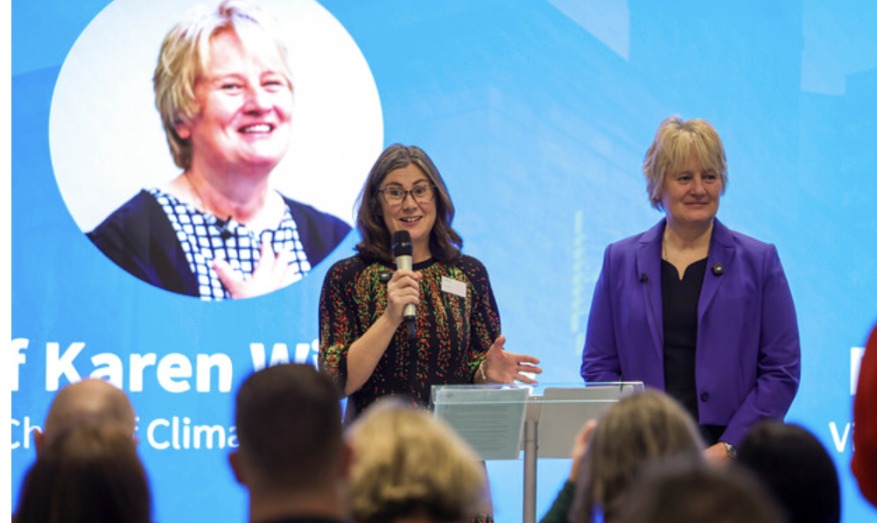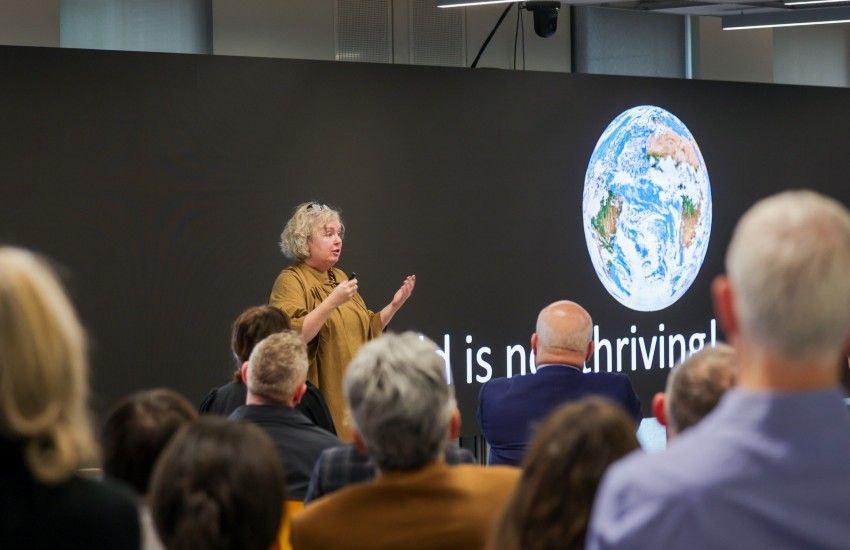Trinity launches Climate Gateway to build momentum for a resilient future
Posted on: 04 November 2025
Professor of Climate Science Karen Wiltshire has spearheaded the Climate Gateway, which is designed to inform policy, develop innovative solutions, and build shared accountability. Anyone interested is encouraged to visit the Climate Gateway website and get involved.

Trinity College Dublin has launched its first Climate Gateway, a pathway to multiple research areas and initiatives across the university that tackle climate change. The Gateway brings together climate researchers, innovators, educators and communities to ensure we share a resilient future.
Professor of Climate Science Karen Wiltshire (pictured above on the right with Prof. Jane Stout) has spearheaded the Climate Gateway, which is designed to inform policy, develop innovative solutions, and build shared accountability. Anyone interested is encouraged to visit the Climate Gateway website and get involved.
“There is too much scaremongering about the climate crisis,” said Prof. Wiltshire. “We forget that Ireland has a tradition of community action and a strong collective awareness of the scale of the challenges we face. It’s not easy, but we can act. Yes, extreme weather, resource pressures, pandemics, sea-level rise, and biodiversity loss are destabilising societies worldwide. But we in Ireland have a real opportunity to show leadership in this space. That’s what the Climate Gateway is about.”
Prof. Wiltshire added: “The Climate Gateway is the traverse between disciplines, between Ireland and the world, and between research and action. By inviting Ireland’s public sector, industry leaders, and communities to walk this exciting traverse, Trinity seeks to confront the climate crisis together and build a thriving, resilient future with generations to come."
Launching the Climate Gateway, Trinity Provost Dr Linda Doyle (pictured below) said: “The University is determined to play its part in this, the defining crisis of our age. By networking and connecting its expertise in science, engineering, health and the humanities with Irish and global partners, Trinity’s Climate Gateway opens new pathways for climate action at scale.”

The launch featured a series of discussions in Trinity Business School, led by Prof. Wiltshire and Vice President for Biodiversity and Climate Action Prof. Jane Stout, and featuring academics, students, policy makers, business and community leaders including:
- Dr Colin Hunt, CEO of AIB Group
- Eirgrid chair Brendan Tuohy, Deirdre de Bhailis, manager of the community enterprise Dingle Hub, and Helen McHenry, Policy Analyst at the Western Development Commission.
- Matt Smith, CEO of nature restoration charity Hometree, and Gerry Clabby, Principal Advisor at the Environment and Climate Research Advisory Unit at DCEE.
- TILDA’s Prof. Cathal McCrory, Colin O’Hehir, Climate Policy Lead, Department of Health, and Róisín Breen, Programme Manager, HSE Climate Action and Sustainability programme.
Further activities included the opening of the Trinity Climate Gateway Exhibition, a mix of student-led projects and interactive art installations, and more.
Sustainability is knitted into all six commitments in Thrive, Trinity’s recently-launched strategic plan for the next five years, reflecting the centrality of climate action and biodiversity loss in the life of the university.
The Trinity Sustainability Office is driving efforts to cut emissions by 51% by 2030 and reach net zero by 2040. This work links climate, nature, and health—linking environmental action with biodiversity and human wellbeing. Campus operations are being transformed through sustainable procurement, energy efficiency, nature-positive actions, increased circularity, and sustainable travel and food. Climate leadership training for staff and students is building a climate-conscious workforce and changing the way we work.
Trinity’s recent research initiatives on climate action include the Climate Co-Centre, a tri-jurisdictional research centre linking the Republic of Ireland, Northern Ireland, and Great Britain and the AIB Trinity Climate Hub, which supports research that identifies and develops solutions to the climate and biodiversity crises and also builds capacity for addressing these challenges through the AIB Climate Leaders programme.
Students are key players in this. Trinity’s Sustainability Strategy aims for all students to develop the knowledge, skills and attitudes to think, plan and act with responsibility and compassion for themselves, each other and the planet. In the E3 Learning Foundry, students will design and test real-world solutions in interdisciplinary teams. Trinity offers a micro-credential in Climate Leadership and delivers postgraduate qualifications in Climate Entrepreneurship, preparing innovators to build businesses that accelerate the low-carbon transition.
The new Climate Gateway will amplify all of these efforts.
Its vision is to better link policy-makers, industry, educators and communities with Trinity expertise while giving students and professionals the opportunity to shape Ireland’s climate future. Surveys have shown exceptional support from the Irish public for climate action. In 2024, the EPA’s Climate Change in the Irish Mind survey found that 81 percent of people in Ireland are worried about climate change, 75 percent think extreme weather poses a moderate or high risk to their community over the next 10 years, and 79 percent say climate change should be either a “very high” or “high” priority for Government.
ENDS
Media Contact:
Catherine O’Mahony | Media Relations | catherine.omahony@tcd.ie
